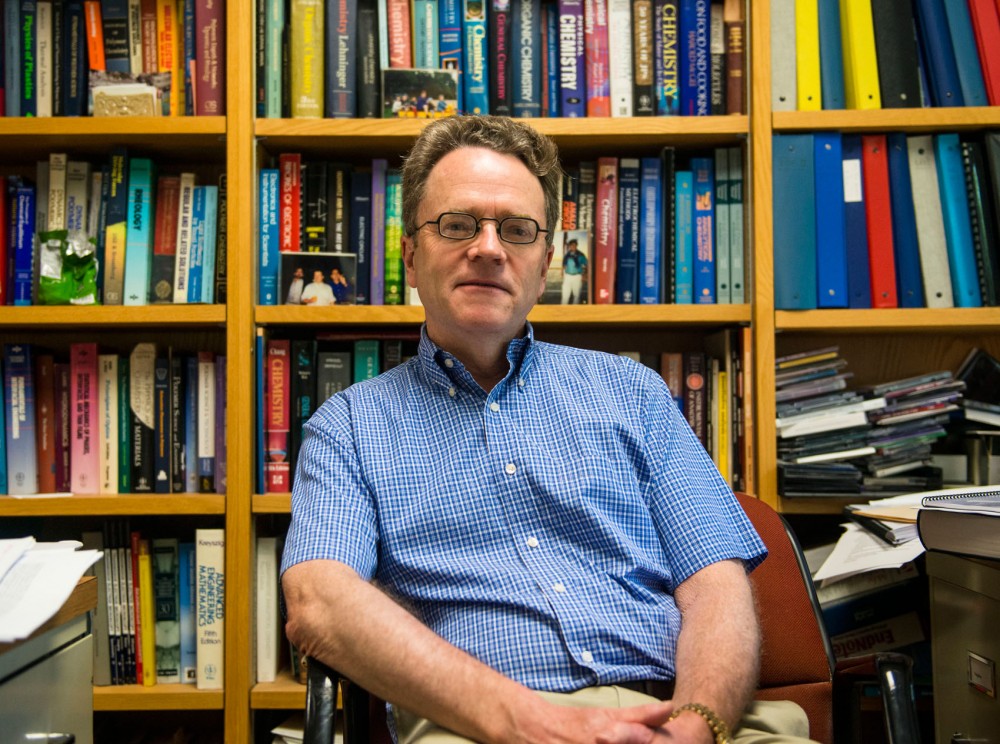Tim Lodge and Steve Polasky hold rare positions at the University of Minnesota — they’re both tenured in two departments.
And now, they share another uncommon experience — last month, they were both named Regents Professors.
Established in 1965, the Regents Professorship is the highest honor given to faculty members at the University. Professors are nominated and then selected by the University president.
The award comes with a $50,000 annual stipend — a $20,000 salary increase and $30,000 to fund their research. There are only 30 Regents Professors at the University, including Lodge and Polasky.
‘A fantastic career’
Growing up in England with a father who taught math and engineering at the University of Manchester, Tim Lodge knew from an early age what it was like to be a professor.
He said his father never complained about his work.
“He enjoyed what he was doing; it wasn’t work,” he said. “I found it to be the same thing.”
Now a professor in the chemistry and the chemical engineering and materials science departments, Lodge said being a professor is “a fantastic career.”
“No one’s telling you what to do,” he said. “You get to do research on things that interest you, and you get to work with great students who are interested in all kinds of things.”
Lodge’s research focuses on block copolymers — molecules made of two or more chemical units. With a team of graduate and post-doctoral students, he’s experimenting ways to combine properties of different man-made materials like plastic and rubber to better understand how they can be used in technology like medical equipment.
His student research assistants said Lodge is always available to talk about research and answer questions, despite how busy he is.
Because communication is important to him, there’s a rule in Lodge’s lab that research assistants must check their email at least three times a day, said post-doctoral student Megan Hoarfrost.
The students working in Lodge’s lab also said he has a good sense of humor. Because many of them have worked there for years, they know Lodge’s quirks, like his quick laugh, dubbed the “Tim Laugh,” said research assistant Lucas McIntosh.
“It’s a delta function of laughs,” McIntosh said. “It’s an infinitesimally short laugh, and it’s over.”
Lodge said he enjoys working with his research team and collaborating with other professors to advise students. His research stipend will save time, he said, because he won’t have to apply for grants before starting a new project anymore.
“If there’s a student … who comes up with a new idea, we can jump on it right away,” he said. “It’s a really wonderful opportunity to branch out in new directions.”
It’s “very appropriate” that Lodge was given the Regents Professorship, said Frank Bates, a current Regents Professor and CEMS department head.
“He’s an intellectual leader,” Bates said. “He’s somebody that has set the pace of advancement in the field.”
A ‘really interesting juncture’
Applied economics and ecology, evolution and behavior professor Steve Polasky was always interested in the environment.
A self-proclaimed math nerd, Polasky found economics useful for thinking about environmental issues.
“I’m at this really interesting juncture between economics and ecology,” he said.
Since coming to the University in 1999, Polasky has done research on sustainable development issues. He said he’s most proud of his recent collaboration with the Natural Capital Project, working to bring environmental thinking to everyday consumer, government and business decisions.
Polasky said he appreciates the visibility that comes with being a Regents Professor and hopes to use the stipend to hire administrative help for his office so he can spend more time doing research and working with students.
EEB professor Sarah Hobbie, who teaches a global environmental policy course with Polasky, said he’s “fabulous to work with.”
Because Polasky is “stretched extraordinarily thin,” Hobbie said, she hopes the new professorship will make it easier for him to do research.
“He’s extraordinarily successful, but he’s also a really down-to-earth person,” she said.
Brian Buhr, who heads the applied economics department, said Polasky brings a useful skillset to the department with his environmental background.
“That inherent interdisciplinary link is really a hallmark of his,” he said.
‘An all-star’
Being a Regents Professor makes it easier to communicate with people outside of the University, Bates said. Regents Professors also have better access to the Board of Regents and University administration.
Lanny Schmidt, a CEMS professor who was named a Regents Professor in 2002, said it’s a humbling experience because so much of the work professors are recognized for is carried out by graduate students.
“You don’t want it to go to your head,” he said. “We don’t do what we get credit for. Our students do.”
It’s a great honor to be a Regents Professor, but there are lots of other qualified professors at the University, said physics Regents Professor Allen Goldman.
“There are probably more people around who are deserving of the accolade than actually get it,” he said.
The distinction doesn’t change professors’ everyday responsibilities, Bates said, but they’re expected to perform at a higher level and are looked on as leaders.
“It’s like being named an all-star on a baseball team,” Bates said. “It’s a great distinction to be on the all-star team, but you still have to go back to your home team; you still have to get up and swing the bat.” 6


